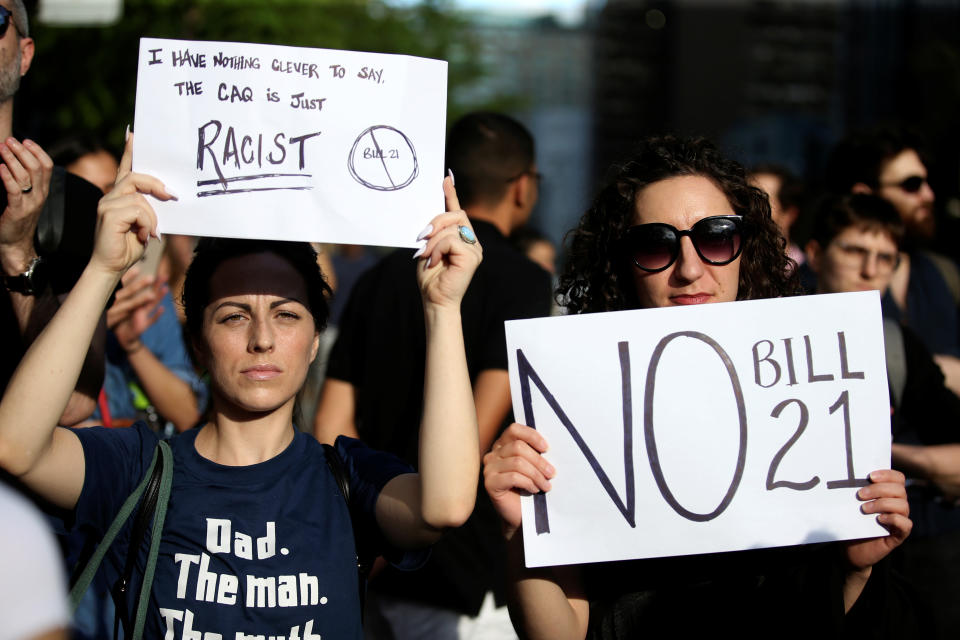Should religious symbols be banned in the public sector? Quebec's secularism bill explained

What’s happening
The Canadian federal election campaign officially kicked off on Wednesday, with party leaders giving speeches across the country. As well as discussing their platforms, they answered questions that centred around Quebec’s secularism law, known as Bill 21.
For residents working in public sectors, including teachers, it means they’re prohibited from wearing religious symbols—such as hijabs, kippahs and turbans—on the job.
While many politicians have remained quiet about the issue, party leaders were pressed to discuss the controversial law publicly last week.
Why there’s debate
Bill 21 made headlines recently as groups pushed to appeal the law that was adopted in June.
Lawyers and activists called Bill 21 a violation of fundamental rights, especially for religious minorities. Conversely, a spokeswoman for the Minister of Immigration, Diversity and Inclusiveness said a “majority of Quebecers supports this law,” and the government “is determined to defend” its legitimacy.
As expected, Bloc Quebecois leader Yves-François Blanchet expressed his party’s support for Bill 21. Conservative Party leader Andrew Scheer didn’t go into much detail when addressing the law. He said he disagreed with it, but would not interfere on the federal level.
Liberal Party leader and Prime Minister Justin Trudeau said he was “deeply opposed” to Bill 21 and was “pleased” it was being legally challenged by Quebecers.
The most critical response came from NDP leader Jagmeet Singh, who has been open about his disapproval. He said Bill 21 seeks to “discriminate [against] people because of the way they look.”
What’s next
An appeal is expected to be heard by Quebec’s highest courts after a Muslim group and a university student decided to fight against Bill 21. The date is still not set. In the meantime, the campaign trail continues and Canadians will vote in the federal election on October 21.
Perspectives
The government shouldn’t decide.
“Prohibiting certain symbols is not state neutrality, it’s favouring non-religion. They [the government] don’t have the jurisdiction to make that choice. Can Quebec determine how the province interacts with religious groups? No.” — Lawyer Catherine McKenzie, Global News
Quebecers are in favour.
“The provincial government gets elected by Quebec voters, so given voters’ overwhelming support for the policy, it’s unlikely to be amended any time soon.” — Forum Research President Dr. Lorne Bozinoff, Montreal Gazette
Let the province work it out.
“We are following very carefully the process. At this time, we feel it would be counterproductive for the federal government to engage in the process with which Quebecers are underway, but we will continue to monitor closely and evaluate our position.” — Prime Minister Justin Trudeau, CBC News
The law excludes minorities.
“The decision for me to wear the symbol is mine and so the one to remove it must also be mine. This law ripped away my dream of being a teacher with force and violence. And sends a clear message that I don’t belong to Quebec society.” — University student Nourel Hak, Montreal Gazette
Other leaders should back off.
“I’m asking all federal parties to make sure, and to assure the population of Quebec, that they won’t participate in any lawsuit against Bill 21. I want them to stay out of it forever — not only for the moment, but forever.” — Quebec Premier François Legault, National Post
Residents shouldn’t have to pick between religion or work.
“I will not give up one part of my identity, which I love, to continue doing something else that I love. I will keep fighting. This is a fundamental human right. The government cannot do anything that will ever persuade me to take off my hijab.” — Teacher Nadia Naqvi to CBC Radio

